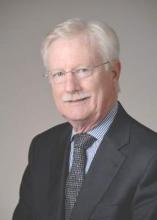“A Common Struggle” by former Rep. Patrick J. Kennedy (D-R.I.) and journalist and author Stephen Fried, describes the fascinating odyssey of a young man attempting to sail intact through the stormy seas of treatment for a mental health/substance use disorder while fighting desperately for parity in mental health and substance abuse treatment in our medical system.
Mr. Kennedy, youngest son of the late Sen. Edward M. Kennedy, inherits more than a legacy of public service. His mother has acknowledged having had a severe alcohol use disorder, and one can trace a significant number of substance use disorders across the extended Kennedy clan. These inheritances produce a remarkable story of struggle that has opened the United States to a potential revolution in the perception and care of mental illness and substance use disorders. The book (New York: Blue Rider Press, 2015) thankfully includes a happy ending for an individual who has now dedicated his life to the cause of treatment parity for mental health and substance use disorders. In a recent interview, the younger Kennedy said he had been sober for 5 years.
The authors develop three parallel themes: the political fight for parity for mental health and substance use disorder treatment, the fight for Mr. Kennedy’s own personal treatment of a serious mental health/substance use disorder, and the evolution of treatment for mental illness and substance use disorders in the United States. Mr. Kennedy struggles early on with mental health issues and substance use disorders, and looks back to his days in high school as being “ill.” Many of the symptoms identified then and later in Mr. Kennedy’s life fit the diagnostic criteria for bipolar disorder, and alcohol and substance use disorders. But it is in Providence, R.I., in college, where the third theme evolves, beginning with his work as a volunteer on a suicide hotline.
Mr. Kennedy then interned at the Rhode Island State House, was elected as a delegate to the 1988 Democratic convention, and ran for the Rhode Island state legislature at the age of 20, while still a college student. From there, he launched a campaign for the House of Representatives from the first congressional district of Rhode Island and served four terms in the U.S. Congress. His political career was marked by a long and successful struggle on the three fronts of parity, stigma, and personal recovery.
The book is a fascinating tour through these themes. We watch a young man grapple with issues confronting many Americans, a battle characterized by secrecy, fear of stigma, misdiagnoses, mind-boggling polypharmacy, and finally, a revolution in treatment. We learn that there are effective behavioral and medical treatments, but they need to be more widely implemented. And more research is needed in brain science to make treatments even better.
The three themes of the book are still in flux. Parity for mental health and substance use disorders remains to be implemented by the medical profession and insurance payers. Congressman Kennedy’s personal treatment will continue to evolve. And the movement from a pure psychoanalytic approach to brain-based treatments of mental health and substance use disorders is an exciting new domain.
This book is a must-read, not only for those suffering from mental health and substance use disorders, but also for the professionals who treat them and for those who pay for that treatment.
Dr. Koob is director of the U.S. National Institute on Alcohol Abuse and Alcoholism. He joined the National Institutes of Health from the Scripps Research Institute in La Jolla, Calif., in 2014. An authority on drug addiction and stress, Dr. Koob has contributed to our understanding of the neurocircuitry associated with the acute reinforcing effects of drugs of abuse, and the neuroadaptations of the reward and stress circuits associated with the transition to dependence. He has published more than 650 peer-reviewed papers and several books, including the “Neurobiology of Addiction” (Academic Press, 2005), a comprehensive treatise on emerging research in the field; and a textbook for upper division undergraduates and graduate students called “Drugs, Addiction and the Brain” (Academic Press, 2014).



